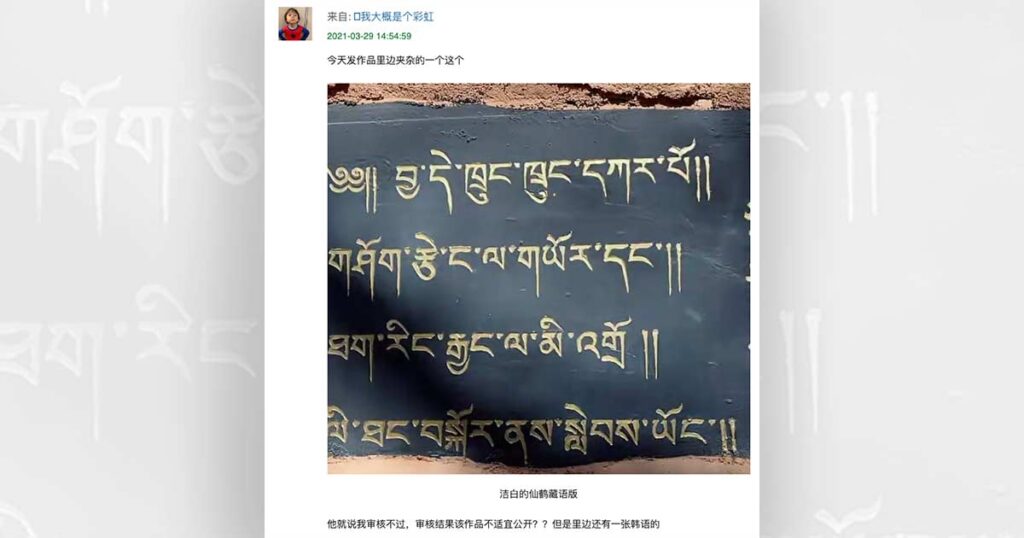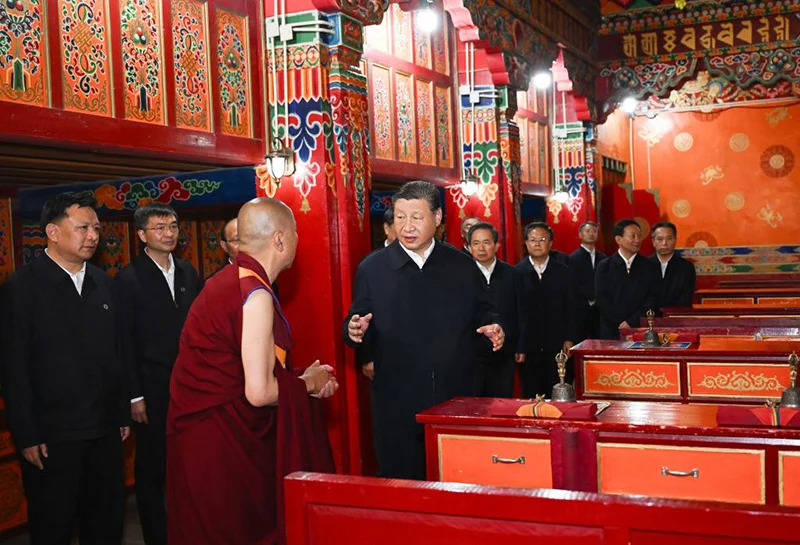-By Claude Arpi for Indian Defence Review, 14 March 2023
China is at it again: “Recognition of new Dalai Lama must be conducted in China”, asserted an article in The Global Times on February 22.
The mouthpiece of the Communist Party explained that the China Central Television has already given a detailed historical account “of the search for the reincarnations of the Dalai Lama and Panchen Lama, who hold equal positions in Tibetan Buddhism. It emphasized that this religious ritual has been supervised by the Chinese Central Government and conducted within Chinese territory since the late 13th century.”
Not only have the Dalai Lama and the Panchen Lama never held ‘equal position’ on the roof of the World, but Tibet was not part of the Chinese territory before 1951 when Mao invaded it; further, in the past in Tibet ‘religious rituals’ for the recognition of the Dalai Lamas were conducted by Tibetans, not by Chinese (or the Emperor).
But half truths and blatant lies continue in Beijing’s narrative: “the reincarnation convention of Living Buddhas in Xizang was established during the Yuan Dynasty (1271-1368), developed in the Ming Dynasty (1368-1644) and improved during the Qing Dynasty (1644-1911) under the administration of the central government.”
‘Xizang’ is the new name given to Tibet. Like for the Tibet-Indian border, Beijing believes that by changing names, it can change historical facts.
The Global Times continues: “Since Xizang’s peaceful liberation in 1951, the central government of the People’s Republic of China showed its respect by preserving this convention and religious ritual. In 1995, the 11th Panchen Lama was conferred with his title by the central government through this strict religious ritual.”
The Global Times dishonestly omits that the boy recognized as the Panchen Lama by the Dalai Lama was arrested and more than 25 years later, he is still in custody of the Chinese government somewhere in China. Does Beijing believe that the world has forgotten?
The article then cites the ‘Measures on the Management of the Reincarnation of Living Buddhas of Tibetan Buddhism’ announced in 2007 by Beijing: “It stipulated that the reincarnation of Living Buddhas should not be interfered with or manipulated by any external forces.”
According to Beijing, the Dalai Lama has no say in his own succession.
Continuous Propaganda
On January 5, quoting so-called experts on Tibet issues, the same Global Times already announced: “The Chinese Central Government will support and guide the work of finding the successor of the 14th Dalai Lama and the successor, like his predecessors, will be finally approved by the Central government.” It added that this was “refuted reports from India media quoting Penpa Tsering, the current head of the ‘Tibetan government-in-exile’, who claimed that China will interfere with the Dalai Lama’s succession.” This declaration shows that Beijing prepares itself to interfere in the succession.
Interestingly, the main ‘expert in reincarnation’ quoted by The Global Times is a hard-core Communist, Zhu Weiqun, former head of the Ethnic and Religious Affairs Committee of the Chinese People’s Political Consultative Conference (CPPCC) who, a few years ago, derailed the negotiations between Beijing and Dharamsala: “For years, the Dalai Lama himself has been making lies to fool people who are not clear about history and the facts,”, Zhu told the tabloid.
However, who is fooling who is clear. How an atheist ‘expert’ does suddenly becomes knowledgeable about the return of a boy’s soul on earth.
Concrete Steps taken?
More worrying than the persistent propaganda about the Communist Party new skills at finding ‘souls, are the concrete steps taken to announce the Dalai Lama’s return on earth.
Shi Taifeng, member of the Political Bureau of the CPC Central Committee and Minister of the United Front Work Department, met with Gyaltsen Norbu, the Chinese selected Panchen Lama on February 17 in Beijing.
The occasion (or excuse) was to ‘congratulate’ Norbu and Tibetan Buddhists for the Tibetan Water Rabbit New Year.
Shi Taifeng started by praising Gyaltsen Norbu for his progress in various domains, then he asserted that he “hoped that he [Norbu] would keep in mind the ardent wishes of General Secretary Xi Jinping and maintain a high degree of consistency with the Party Central Committee with Comrade Xi Jinping as the core in ideology, politics and action; play a leading and exemplary role, study and implement the spirit of the 20th CPC National Congress in depth.”
Does it mean that the Chinese-selected Panchen Lama is not trusted and remains a Tibetan at heart? Apparently, he does not fully understand and follow the ‘The Two Establishes’?
In Communist jargon, the Two Establishes are: “To establish the status of Comrade Xi Jinping as the core of the Party’s Central Committee and of the whole Party and to establish the guiding role of Xi Jinping Thought on Socialism with Chinese Characteristics for the New Era.”
Shi’s message clearly was, “you better follow Xi and the Party, otherwise…”
Beijing must still have in mind the 10th Panchen Lama, who was also selected and groomed by the Party in the 1950s, but openly declared in 1964: “Long Life to His Holiness the Dalai Lama”. He was subsequently jailed for 14 years.
Shi also told Norbu to “refine his knowledge and moral character, and make new achievements in upholding the Chinese orientation of our religion and promoting the adaptation of Tibetan Buddhism to socialist society.”
The Objective of the Communist Party
On the eve of Tibetan New Year, a Chinese government website, China News Service (ECNS) published an interview with Sheng Kai, vice president of Tsinghua University’s Institute of Ethics and Religion, about the real objective of the Communist Government: the sinization of Tibetan Buddhism.
The journalist asked Sheng: “Since Buddhism was introduced from India to China more than 2,000 years ago, it has not only merged with Chinese culture and philosophy, but also deeply integrated into the daily lives of Chinese people without their noticing. Has the Sinicization of Buddhism been completed? Can the historical process be interpreted as the secularization and Sinicization of Buddhism?”
Sheng explained that Buddhism, though it came from India, it had “to be compatible with the traditional inheritance of Confucian and Taoist cultures, blended into the faith and belief of the Chinese ritual culture …so discussion of the historical connotation of the Sinicization of Buddhism means exploring the process and laws of Buddhism’s transformation from an alien civilization to Chinese religion…”
One of his conclusions is that Buddhism in China has four fundamental characteristics; the last being: “an integration of globalization and localization. As a result of the Sinicization of Buddhism, Chinese Buddhism is not only a local transformation of religious civilization from overseas [read India] but also a rediffusion to East Asia and Southeast Asia.”
Clearly Xi Jinping and the Party would like to forget that Buddhism came from India and transform it into a Chinese secular Marxist religion which would in turn spread in Asia.
Clearly Xi Jinping and the Party would like to forget that Buddhism came from India and transform it into a Chinese secular Marxist religion which would in turn spread in Asia.
The control over the succession of the Dalai Lama is the key for this plan.
Can Beijing succeed?
A Way Out
One solution to avoid controversies after the present Dalai Lama’s departure has been mentioned by the Tibetan leader himself in 2011.
The Dalai Lama spoke of the origin of the custom of recognizing ‘Emanation Bodies’ or ‘tulkus’; he further elaborated: “The main purpose of the appearance of a reincarnation is to continue the predecessor’s unfinished work to serve Dharma and beings.”
The Tibetan leader spoke of an alternative, which would be less disruptive: “Alternatively it is possible for the Lama to appoint a successor who is either his disciple or someone young who is to be recognized as his emanation.”
A problem linked to incarnations is that finding the new reincarnation can be manipulated at will; for example, serious doubts have been be raised about the authenticity of lamas such as Gyaltsen Norbu, the Chinese-selected Panchen Lama.
Viewed from a political angle, many issues would be solved if the Dalai Lama decides to go for an ‘emanation’.
He himself would select the next Dalai Lama and the Chinese would have nothing to say in the process; it would certainly bring far greater stability to the political scene of Tibetans in exile and the Himalayan belt.
But the final decision is the Dalai Lama’s choice.
In the meantime, India should clearly state that the 15th Dalai Lama will be a ‘guest of honour’ if he decides to come back to India, whether as a reincarnation or an emanation.
Click here to read the original report IDR.





